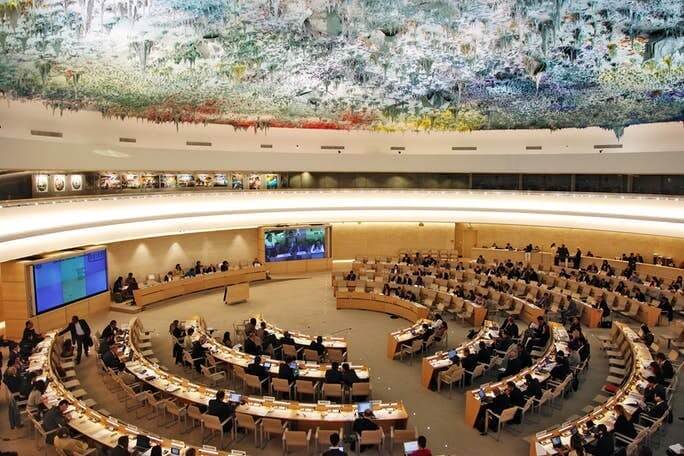NEW YORK (October 4, 2018) — Today, the Human Rights Foundation (HRF) submitted two individual complaints to the United Nations Working Group on Arbitrary Detention (UNWGAD) requesting that it initiate a formal investigation into the arrest, pre-trial detention, and unwarranted charges of Cambodian journalists Uon Chhin and Yeang Sothearin, as well as the wrongful conviction and harsh sentencing of Iranian web programmer Saeed Malekpour. Uon and Yeang formerly reported on land rights and social issues for Radio Free Asia, an independent media outlet that was forced to close its Phnom Penh office in September 2017. Malekpour, an Iranian-Canadian technologist, created an open source software program to improve website photograph uploads, and was arrested 10 years ago today.
“In the last year, Hun Sen’s fully authoritarian regime in Cambodia has intensified its crackdown against independent media outlets in the country. Journalists like Uon and Yeang have been targeted and arrested simply for doing their jobs,” Joy Park, legal counsel for Asia at HRF, said. “We urge the United Nations to declare that by detaining Uon and Yeang, the Cambodian government violated their freedom of expression, freedom of association, and right to a fair trial. As a member state of the U.N., the Cambodian government failed to fulfill its obligations under international human rights law.”
Uon Chhin and Yeang Sothearin were arrested without a warrant on November 14, 2017, and held in pre-trial detention until August 21, 2018, when they were released on bail under court supervision. Uon and Yeang were not allowed to retain a lawyer within 24 hours of their detention, although Cambodian law mandates detainees be allowed to do so. Both journalists were wrongfully charged with “espionage” under Article 445 of the 2009 Cambodia Penal Code, a widely-criticized law that restricts civil and political rights and is often manipulated to target the regime’s political opponents. Uon and Yeang face up to 15 years in prison on this charge, for which the government has failed to provide any clear evidence. The investigating judge repeatedly denied the journalists’ appeal requests and rejected their request to nullify legal proceedings. The journalists’ trials are part of a continuing crackdown by Prime Minister Hun Sen’s regime on freedom of association and expression throughout Cambodia.
HRF has also submitted a petition on behalf of Saeed Malekpour, who was violently abducted and arrested in Iran, without a warrant, on this day 10 years ago.
”The Iranian regime and other authoritarian states like China, Saudi Arabia, and Russia, are doing whatever they can to maintain their censorship regimes in the digital age. They have invested in technologies for monitoring and manipulating internet users; they prosecute anyone who dares to criticize them online; and they often detain internet entrepreneurs and computer scientists who could give citizens greater access to information,” Celine Assaf Boustani, international legal associate at HRF, said. “Malekpour’s case is just one example of this crackdown on technologists. His arbitrary detention violated his right to free expression and Iranians’ right to access information, and should not go unnoticed. We urge the United Nations to hold regimes like Iran accountable for their violations of international law.”
While in detention, Saeed Malekpour was denied access to his family and legal counsel, repeatedly and brutally beaten, and forced to make a false confession that was extracted under torture. After multiple, prolonged periods of solitary confinement in Iran’s notorious Evin Prison, Malekpour’s trial finally began in November 2010. The Court admitted Malekpour’s false confession, and he was sentenced to death on charges of “spreading corruption” and “insulting the sanctity of Islam” under Articles 286 and 513 of the Islamic Penal Code. In August 2013, Malekpour’s sentence was commuted to life imprisonment. He remains in prison today, and is continually subjected to torture. Malekpour’s case is a part of Iran’s media censorship campaign, which started in mid-2000 and which has led to the detention and prosecution of numerous internet experts under vaguely-defined national security charges.
These individual complaints were submitted as a part of HRF’s impact litigation project. In 2017, HRF submitted three petitions in defense of individuals who had been arbitrarily arrested in Cuba, Turkmenistan, and Zimbabwe. The petitions led to decisions by the UNWGAD declaring their arrests arbitrary and calling for compensation under international law.
The Human Rights Foundation (HRF) is a nonpartisan nonprofit organization that promotes and protects human rights globally, with a focus on closed societies.
Read HRF’s submission on Uon and Yeang here. Read HRF’s submission on Malekpour here.
Learn more about conditions in Iran’s prisons by watching activist and author Marina Nemat’s Oslo Freedom Forum talk here. Learn more about Cambodia’s political opposition by watching opposition leader Mu Sochua’s Oslo Freedom Forum talk here.
For press inquiries, please contact media@humanrightsfdn.wpengine.com.
